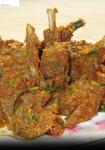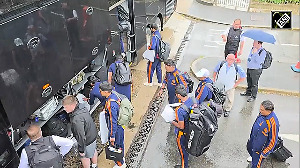'These reports of cases being very low in other states, is it true? Are the numbers believable?'
Shyam G Menon discovers resilience and a determination to adhere to Covid protocols on a recent visit to Kerala.

In early July, as my friend and I chalked out plans to spend Onam in Kerala, we had a tough time deciding.
COVID-19 case numbers were high in the state.
In our subsequent travel of early August -- a few days in Kochi and then onward to Thiruvananthapuram -- the sentiment we picked up was: The pandemic is a serious matter but the people of the state have also got to live.
Night, August 6. On arrival at Kochi, we informed the airport's health desk of our full vaccination and negative RT-PCR status. They collected our contact details.
The waiting time for Uber was long. So, we hired George's airport taxi.
On the long drive to Fort Kochi through pouring rain, he provided vignettes of income squeezed and life turned tough by the virus.
The state's prolonged rendezvous with the virus took a toll on livelihood, shops and businesses -- that has been reported.

Early next morning, we had tea at Jumaila's small shop, close to the St Francis Church where Vasco da Gama was originally buried.
At a nearby playground, we saw hockey players training and youngsters enjoying slack-lining.
With Onam approaching, restrictions had been eased. Jumaila assured us that in the coming days, everything would be more normal. She appeared well informed.
Between making cups of tea, she spoke of the impending third wave, the need to follow safety protocols and the uncertainty still in the air.
The part of Fort Kochi we were in was nice for jogging. Traffic wasn't much. I checked with a policeman, if it was alright to jog. "Morning walk and jogging are allowed," he said.
The policeman's reply was a morale booster as there was nothing but gloom and doom about Kerala on the Internet. It was either news of raging pandemic or Right-wing trolls ganging up to bash the state for its political preference.
A good run keeps depression at bay.
Sam, the owner of our homestay, gave us an overview of the locality. We chalked out a small, safe loop to run on.
Sunday morning brought forth more people to the playgrounds in the area; this time middle aged football players in full kit.
Some of the earliest instances of cricket played in the subcontinent was in Kerala. But football, volleyball, basketball, badminton, athletics and swimming - these have traditionally been more popular.
That's a delightful change in the sporting culture as you travel from cricket ridden-Mumbai to Kerala.
Besides Jumaila's tea shop, we located another small outlet selling tea and snacks.
The best tea award should however go to Shivanandan. An elderly person with a cycle-borne tea stall, he served us excellent herbal tea on a Sunday evening of no shops open due to weekend restrictions.

Despite pandemic and lockdown, the wish to be active and alive was palpable. Hailing from Perumbavoor, Shias ran a plywood business and drove for Uber in his spare time.
On our drive from Fort Kochi to Ernakulam's railway station, he expressed concern about the high COVID-19 case numbers in Kerala.
There was the relaxation of restrictions for Onam, people moving around as a result and specific to his line of work, the increased traffic in Ernakulam.
"But you can't fault people. They have grown tired of sitting at home. How long will you live with restrictions?" he asked.

In tune with pandemic protocols, the platform at Ernakulam railway station admitted only ticket carrying-passengers. There was no crowding. Most of the seats in the chair car of the train we boarded, were occupied. People wore masks. They removed it only for sipping tea or eating.
Over the next few days, as our stay in Thiruvananthapuram unfolded, that was something we noticed -- people wore masks voluntarily and given spitting is less in Kerala compared to North India, improperly worn masks and faces without masks were rare sights.
Not one autorickshaw or taxi driver we encountered, was without a mask. All the rickshaws we got into sported a plastic barrier between driver and passengers.
Many shops had sanitiser-dispensers kept outside and at big shops, our temperature was checked, disposable gloves provided and names and phone numbers recorded in a register.
What seemed difficult was physical distancing in places where people converge, like bazaars, giant super markets and of course, based on what we read in the papers -- that bane of Kerala: its liquor outlets.
Congestion is a paradigm problem in Kerala, a narrow, long state to begin with.
Probably knowing these challenges, none of the elders in my extended family had ventured out from their houses during the pandemic except for unavoidable engagements like getting their vaccine shots.
We heard stories of people who sanitised everything that entered their compound; some even washed their car tyres in a bid to keep the virus out.

By August, Kerala was contributing fifty per cent of the total COVID-19 cases reported daily in India.
On August 11, the media reported the head of the central medical team which visited the state to study the continued rise in COVID-19 cases, stating truths Kerala has known for long as overall paradigm.
Unlike in North India, the rural-urban divide in densely populated Kerala is, minimal.
There are no extended farm tracts marking such divides as found in North India.
Home isolation's effectiveness is diluted by the linear dwellings.
The longer life the state's health care system gifts inhabitants, means a higher share of senior citizens in the population. Underlying comorbidities are high.
Finally, plenty of Keralites work elsewhere in India and abroad, causing in turn a large number of people who keep coming and going.

Each state in India is different.
The medical observations of the central team didn't interest me as much as these non-medical ones, for what is a recommendation for disease management if you refuse to see the underlying reality, if your perspective is rooted in vision of homogenous country?
I was happy to see the central government noticing things beyond Sabarimala, Communism, beef, literacy and secularism -- topics the Right-wing needles Kerala with.
The team's findings appeared a Vasco da Gama-moment. Having discovered Kerala, the Centre hopefully ensures adequate supply of vaccines. Else, we can be assured of continued mutual distrust.

At a photostat shop in Thiruvananthapuram we visited to make copies of our ID papers, we found a small notice credited to the local police that asked people not to be scared of the virus but exercise prudence and caution. It summed up the general tenor.
The quest was to observe protocols, maintain safety and somehow live one's life alongside. Meanwhile, every night, the television news droned of high case numbers in Kerala, quite likely to nobody's surprise.
A doctor-friend we met, said numbers will go up as restrictions ease. The numbers are also high due to wider testing, he added.
In this ambiance shaped by pandemic and heartless data, Thiruvananthapuram served up an unexpected delight.
On my last visit to the city in 2018, I had sensed my morning run progressively spoilt by traffic.
You lose the fun in running when a city's vehicle population increases. Kerala is an automobile crazy state.
Lost to vindication by material possessions and wealth, families buy cars. Besides causing congestion and pollution in a state with little free space, the trend hampers activities like walking, running and cycling and thereby people's health.
On the other hand, the pandemic has highlighted the importance of investing in health and immunity.
To our delight, we found that even as traffic prevailed, a good number of people -- more than I had seen on earlier visits -- were walking, running and cycling in Thiruvananthapuram.
In particular, the number of recreational cyclists on the road seemed to have risen.
Every morning, we joined the city's devotees of the active lifestyle; running or walking. Evenings we sometimes ran loops at the local stadium.
The run of August 15 was especially enjoyable. Despite the Azadi ka Amrut Mahotsav, it was a quiet Sunday morning in Kerala's capital. There were fewer people on the road and no strident patriotism on display. It felt peaceful.

Ten days later, on August 25, Kerala reported over 30,000 new cases. Our return was via Kochi. Benny showed up to ferry us from Ernakulam Town railway station to our place of stay in Fort Kochi.
For quite some time it was a silent ride. Then, past the shipyard, we got talking.
Upon learning that we were from Mumbai, Benny asked, "These reports of cases being very low in other states, is it true? Are the numbers believable?"
Good point. I said, the numbers are officially low but I shared his doubt.
"So I guess, we are testing more and not holding back on revealing the figures," he rationalised.
Unlike Shias, Benny lived a retired life (he used to work in the Middle East) interspersed with the occasional Uber trip.
"How long will you live fearing this virus? People have to work -- don't they?" he asked. It summed up the prevailing mood.
There is a question I ask myself: Why do I love Kerala despite critics, hell bent on faulting the state?
The closest answer I have is the logic found in "chai-kadi"; a cup of tea and something to eat.
Amid life plagued by mercantilism and reduced thereby to polarized income and unaffordability, the affordable chai-kadi is a lighthouse reminding us of commonsense.
Shanu's small eatery, run from a cart in Rose Street, Fort Kochi, was just that -- affordable, tasty food.
Freelance journalist on shoestring budget was happy to discover it; after his morning jog, Vasco da Gama tucked into puttu-kadala.
While the Internet dripped sarcasm for Kerala, Shanu's cart kept commonsense alive.
Shyam G Menon is a Mumbai-based columnist.
Feature Presentation: Ashish Narsale/ Rediff.com











